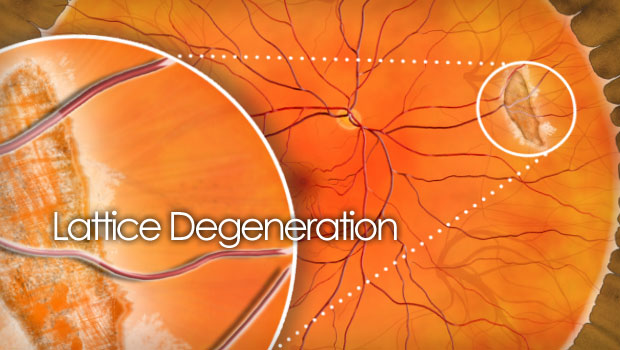Lattice Degeneration: Causes, Symptoms, and Treatment
Lattice degeneration is a common eye condition that affects the retina, potentially leading to more severe issues if left untreated. In this comprehensive guide, we’ll explore lattice degeneration, its causes, symptoms, and available treatments, all while adhering to the latest SEO best practices.
Lattice Degeneration

Lattice degeneration is a condition characterized by thinning and weakening of the retina, particularly in the peripheral areas. While it often goes unnoticed, understanding this condition is essential. Here’s a closer look at the basics.
What is Lattice Degeneration?
Lattice degeneration refers to the thinning and atrophy of the retinal tissue, primarily occurring in the outermost regions. It’s a common eye condition that often presents no symptoms but can pose significant risks.
Causes
Understanding the underlying causes of lattice degeneration is crucial for prevention and early intervention. Let’s delve into the factors that contribute to the development of this eye condition.
What Causes Lattice Degeneration?
Lattice degeneration can be linked to various factors, including genetics and collagen abnormalities. Genetic predisposition plays a significant role, and certain collagen irregularities can weaken the retina.
Recognizing Symptoms
While lattice degeneration often progresses silently, recognizing its symptoms and risk factors is vital for early detection and intervention. Let’s explore the signs that individuals should be aware of.
Common Symptoms and Warning Signs
Lattice degeneration typically doesn’t cause noticeable symptoms. However, individuals may experience occasional flashes of light, floaters, or a sensation of seeing a curtain or shadow in their peripheral vision.
Diagnosis and Medical Evaluation
Diagnosing lattice degeneration involves a comprehensive eye examination by an ophthalmologist or optometrist. Early detection is essential for timely intervention and preventing potential complications.
Diagnosis Process
Eye specialists typically diagnose lattice degeneration during routine eye exams. They will carefully examine the retina and may use imaging techniques such as optical coherence tomography (OCT) to assess the condition.
Treatment Options
Lattice degeneration often doesn’t require treatment, especially when it doesn’t cause symptoms. However, for cases with potential risks of retinal detachment, specific treatment options are available.
Treatment Approaches
The decision to treat lattice degeneration depends on various factors, including the presence of symptoms, the extent of retinal thinning, and the risk of retinal detachment. Treatment options may include laser photocoagulation to seal weak areas or cryopexy to freeze them, reducing the risk of detachment.
Living with Lattice Degeneration
For individuals diagnosed with lattice degeneration, regular eye care and monitoring are essential. This section provides guidance on how to manage the condition effectively and maintain eye health.
Managing Lattice Degeneration
Living with lattice degeneration often involves proactive measures such as regular eye check-ups, avoiding activities that could increase the risk of eye trauma, and promptly reporting any changes in vision to your eye care provider.
Ongoing Research and Future Outlook
Advancements in medical research are continuously shaping the understanding and management of lattice degeneration. This section explores the latest developments and the promising future prospects in the field.
Research in Lattice Degeneration
Ongoing research efforts focus on better comprehending lattice degeneration’s underlying mechanisms and improving treatment options. Collaborations between medical professionals and researchers are paving the way for innovative approaches.
FAQs About Lattice Degeneration
What is lattice degeneration, and how common is it?
Lattice degeneration is a condition where the retina becomes thin and weak, particularly in the peripheral areas. It’s relatively common and often goes unnoticed.
Are there any noticeable symptoms of lattice degeneration?
Lattice degeneration typically doesn’t cause symptoms. However, individuals may occasionally experience flashes of light, floaters, or a shadowy curtain in their peripheral vision.
What are the risk factors for developing lattice degeneration?
The primary risk factor is genetics, as it often runs in families. Having a family history of lattice degeneration increases the likelihood of developing the condition.
How is lattice degeneration diagnosed?
Lattice degeneration is typically diagnosed during routine eye exams. Eye specialists examine the retina and may use imaging techniques like optical coherence tomography (OCT) for evaluation.
Is treatment required for lattice degeneration?
Not all cases require treatment. Treatment decisions depend on factors such as symptoms, extent of retinal thinning, and risk of retinal detachment.
What are the available treatment options for lattice degeneration?
Treatment options may include laser photocoagulation to seal weak areas or cryopexy to freeze them, reducing the risk of retinal detachment.
Can lattice degeneration lead to retinal detachment?
While lattice degeneration itself is not retinal detachment, it can increase the risk of detachment. Timely diagnosis and appropriate treatment can help prevent this complication.
Is there a cure for lattice degeneration?
There is no cure for lattice degeneration, but early detection and intervention can help manage the condition effectively and prevent complications.
How can I protect my eye health if I have lattice degeneration?
Maintaining regular eye check-ups, avoiding activities that could cause eye trauma, and promptly reporting changes in vision to your eye care provider are essential for managing lattice degeneration.
Is lattice degeneration related to other eye conditions?
Lattice degeneration is associated with a higher risk of retinal tears and detachment. It’s crucial to monitor your eye health and seek professional advice as needed.
Conclusion
In conclusion, understanding lattice degeneration, its causes, symptoms, and available treatments, is crucial for preserving your vision. By being proactive and seeking timely medical attention, individuals can minimize the potential risks associated with this eye condition.




